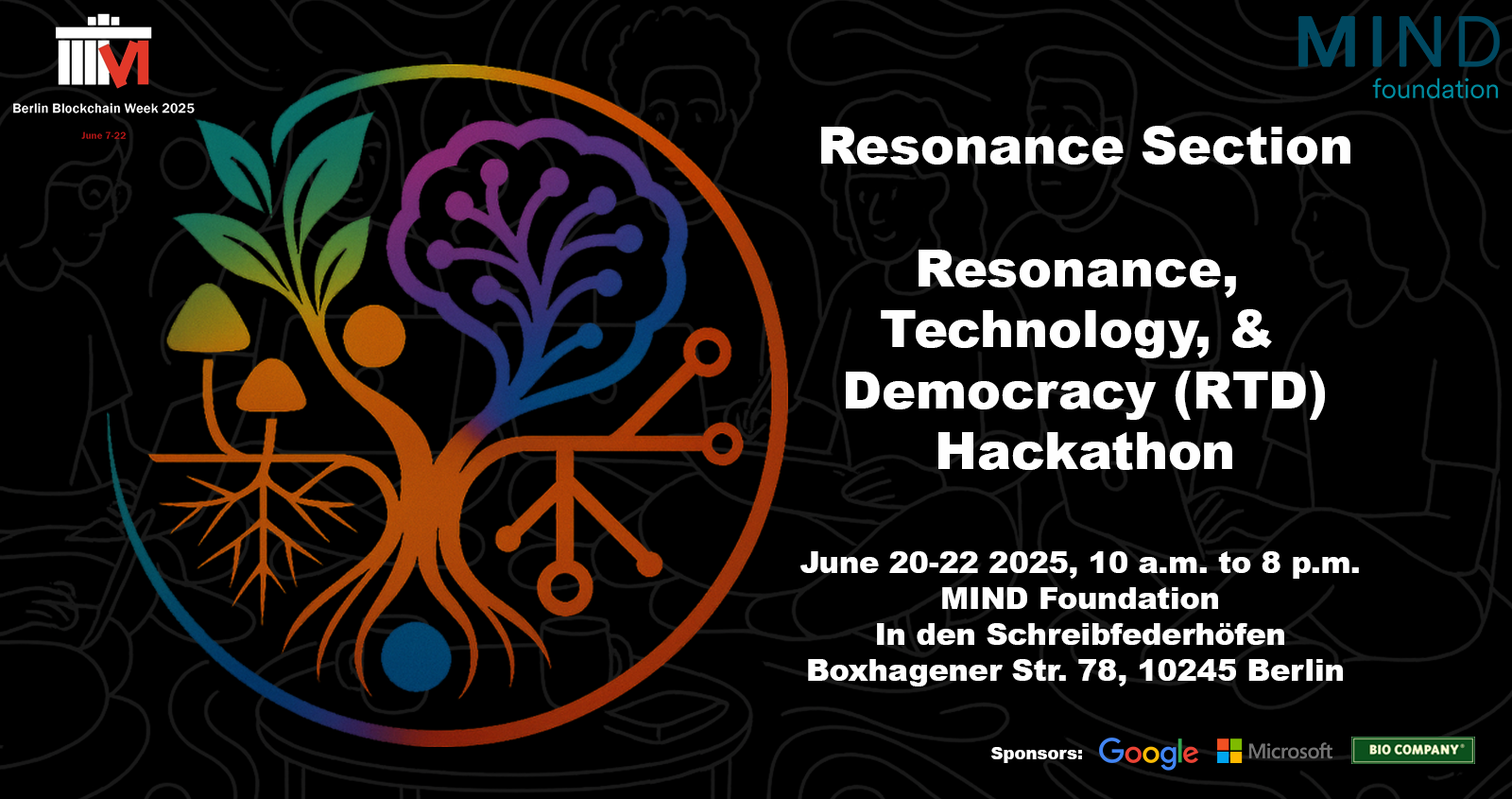RTD@BBW 2025 Hackathon
Resonance, Technology, and Democracy: Vibe Coding for a Scalable Culture of Consciousness

The RTD@BBW 2025 Hackathon is about scaling meaningful human connection and sustainable transformation — about facilitating Resonance, developing Technology, and supporting Democracy.
We especially invite non-programmers to join us in prototyping collaborative open-source technologies that facilitate resonance spaces.
Please note: Since we are utilizing AI, this event does not require any programming skills.
What are Resonance Spaces?
Resonance spaces are contexts in which the relational mode of resonance is more likely. According to socio-philosopher Hartmut Rosa, resonance is a desirable mode of being in the world, a form of relationship with the world that is characterized by being able to reach and be reached and transformed by others, things/objects, totalities such as nature, art, technology, spiritual entities, and the world as such (see this video).
We are looking forward to sharing our enthusiasm for developing tools and systems that foster organizations in science, therapy, and education, engaged in an ethical culture of consciousness, built on principles of resonance, plurality, participatory democracy, and collaborative technology (please see below for details and background information).
Details
- Date: June 20-22, 2025
- Time: 10 a.m. to 8 p.m. daily
- Location: MIND Foundation, In den Schreibfederhöfen (2nd backyard, Boxhagener Str. 78, 10245 Berlin)
- Format: In-person
- Cost: Free
Background
Scaling a Culture of Consciousness With Humane Technology
Organizations that promote the development of an ethical culture of consciousness (for more, see mind-foundation.org/blog/bewusstseinskultur or The Enculturation Problem, face the privilege and challenge of dealing with meaningful experiences that people have, for example, in therapy, nature immersion, or social gatherings.
On the one hand, such experiences are inherently subjective and often difficult to share effectively beyond small social levels. On the other hand, effective sharing at scale is necessary to stimulate change in a larger cultural context. For example, in organizations that strive for a culture of consciousness, patients, researchers, therapists, or educators face the challenge that available scaling tools (e.g., social technology, governance platforms) are still underdeveloped. One reason for this being communication hurdles with programmers who are supposed to implement such tools.
Tools that may help the culture of consciousness could be implementations like:
- an interactive map to locate academic journal clubs,
- a platform to dynamically and iteratively draft a code of conduct and best practices for integration circles with a world wide finder and ranker of these,
- a tool to help sound therapists and breath workers to visualize sound and intensity for increased therapeutic effect,
- a “reddit” for insights, an independent social network platform that connects different subgroups and stakeholders, etc.
People should not serve technology. Instead, technology should help — and not hinder — people and organizations in creating resonance spaces and discovering meaning. We believe that this is more likely when technology follows pluralistic principles, such as treating human connections as paramount, democratizing access to technology, and improving democracy and governance with technology (for more on the plurality movement, see plurality.net).
Collaborative Vibe Coding Enables A Hackathon for Everyone
Focus areas of the hackathon include:
- Exploring decentralized, pluralistic, collaborative, non-proprietary tools and systems
- Brainstorming practical applications to build an ethical culture of consciousness
- Enriching practice with a scientific underpinning
Collaborative vibe coding* has the potential to facilitate a creative and pluralistic process as it helps non-programmers to build software by translating plain language into code language. Importantly, for us, vibe coding is not only about AI-assisted programming. It is about knowing the “vibe” that tool end-users envision should have and cultivating a shared vibe among people in an immersive atmosphere of open, safe, free, accessible, and inclusive discussion.
The practical coding sessions will be interwoven with breaks of “food for thought and tummy” flash talks with social-psychological science communications in theory and empirical findings to benefit designing social and humane technology (on topics such as empathy, self-other merging, shared reality, extended cognition).
*Vibe coding = “Vibe coding is a term for coding with the assistance of AI — essentially, using AI tools to do the heavy lifting of writing code while you focus on guiding the process with ideas and descriptions.”
(Medium Article on Vibe Coding)
Organizers
The MIND foundation is a Berlin-based non-profit science, therapy, and education organization with the mission to bring psychedelic therapy into public health care. The hackathon is facilitated by software engineer Bastin Jafari (background in philosophy and computer science, IT-Manager at MIND, CTO buddyhelp.org) and social psychologist Dr. Till Kastendieck (HU Berlin), section organizers of the Resonance Section at the MIND Members Association.
Contact
For questions about the RTD@BBW 2025 Hackathon, please contact
bastin.jafari@mind-members.org
and/or
till.kastendieck@mind-members.org